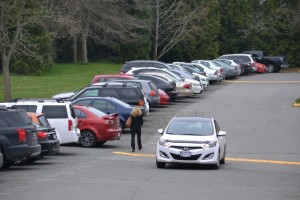Proposed legislation by BC Finance Minister Mike de Jong will deny students that have defaulted on their student loans a driver’s licence renewal through ICBC, and student groups such as the Canadian Federation of Students are not happy about it.
BC student debt and interest rates have never been higher, causing the provincial government to only collect $17.3 out of $185.5 million owing in 2013/14.
Zachary Crispin, chairperson of the Canadian Federation of Students-BC (CFS-BC), says that the proposed legislation is unfair to students and counterproductive to getting students out of debt.
“Denying a driver’s licence to young people struggling to pay back their loans is sure to cost jobs, resulting in more defaults, not fewer,” says Crispin.

Crispin points out that this piece of legislation will paint people defaulting on their student debt as negligent, when the situation of postsecondary education in BC has set the stage for extreme student debt.
“The reason why so many people are in such a high amount of student debt is that we have the worst student financial assistance in all of the country, and the highest tuition fees in the history of our province,” says Crispin. “This very government has made it a perfect climate for us to have a mounting student debt crisis.”
Under the proposed legislation, those unable or unwilling to repay their student loans would have to be in good standing for a year in order to qualify for a driver’s licence renewal.
Rachael Grant, external executive of Camosun College’s Student Society, mirrors the CFS’ Crispin, saying the proposed legislation is a bad idea.
“This is an unfair and unproductive step that the BC government has taken,” says Grant. “It is counterproductive and counterintuitive, as students won’t be able to drive to hold down a job or get one.”
The inability to drive in BC would make life exceedingly difficult, as Crystal Robertson, first-year University Transfer student points out.
“I think of a licence as having freedom,” says Robertson. “People need a vehicle, especially on the island and places where it is difficult to access transportation.”
Meanwhile, Tamara McLean, ICBC senior communications specialist for Vancouver Island, says that ICBC can only follow policy based on legislation.
“We do what the government tells us to do,” says McLean.
Alex Semple, second-year Earth and Ocean Science student, raises important questions around the extremeness of the proposed legislation.
“At what detriment to the Canadian government is having students take a little bit longer to get their loans paid back?” says Semple.
The BC government saw a surplus of $879 million this year and BC students have one of the best track records for loan repayment in Canada.
According to Minister of Advanced Education Andrew Wilkinson, 70 percent of postsecondary students graduate without debt. But Wilkinson’s numbers have Crispin and Grant confused.
“It’s very confusing; his statistics don’t match the BC government’s statistics at all,” says Grant.
Crispin claims that Wilkinson deliberately skewed the figures to downplay the debt crisis in BC, and what students really need is more financial help.
“We found that about 50 percent of people who go through postsecondary education take on some form of student financial systems,” says Crispin. “We should be making sure that people aren’t going into this sort of debt in the first place.” (Wilkinson would not make a statement to Nexus on the matter.)
Students and student groups agree that how the provincial government decides to fund postsecondary institutions and deal with student debt is related to the value the government puts on higher education.
“It depends on what value we put on higher education,” says Semple, “and is it enough of a benefit to our country, to our culture, and to our world that we should be putting people at risk and discouraging people from getting a higher education because of financial investment costs?”
